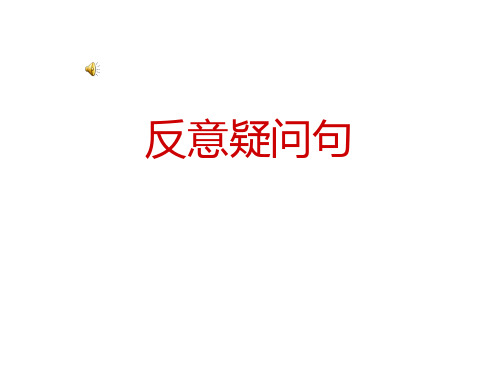课件__专题十三__反意疑问句、祈使句、感叹句以及其它特殊句式
反意疑问句精品PPT课件

(2)I don’t believe she knows it, does she?
(3)You don’t think he can finish the work, do you?
二.情态动词must的反意疑问句
(1)L et’s go home now, shall we?
(2)L et us help you, will you?
八. 陈述部分若是采用neither……nor, not only…but also,等连接主语时,疑问
部分的主语应用复数,如: Neither you nor I can do it, can we?
I’m late, aren’t I ?
Do some exerises
1.(2008上海二联)When you are dressed in the
latest style, dancing to the most fashionable music after watching the latest film, you feel great,__?
(1)He must have met her yesterday, didn’t he?
三.当陈述部分有have to/has to/had to时 ,疑问部分一般用do的相应形式,如:
(1)We have to get up at four tomorrow, don’t we? (2)They had to leave early, didn’t they?
四.当陈述部分有seldom, hardly, few, little, no, never, nothing, nobody, nowhere等否定词或半否定词时,疑问 部分要用肯定形式,如:
反义疑问句最全PPT课件

3.陈述部分由neither… nor, either… or 连接的并列主语 时,疑问部分根据其实际逻辑意义而定。
Neither you nor I am engineer, are we?
4.陈述部分主语是指示代词或不定代词everything, that, nothing, this, 疑问部分主语用it。
(二)陈述部分有表示过去的时间状语,疑问部分的动词 就用一般过去时。(didn’t + 主语) She must have read the novel last week, didn’t she?
b 表示否定推测时,否定式通常不是must not,而是 can’t (cannot) He can’t have been to your home because he doesn't know your address, does he?
6.否定前缀不能视为否定词,其反意疑问句仍用否定形式。 It is impossible, isn’t it? He is not unkind to his classmates, is he?
7.当主句是由so引起的一个句子,而且译为“这么说来” 时,疑问部分的谓语形式(肯定或否定)应与主句保持一 致。 So you have seen the film, have you? So he has not been to Beijing, has he?
b. 带有定语从句,宾语从句的主从复合句,疑问部分谓 语根据主句的谓语而定 He is not the man who gave us a talk, is he? He said he wanted to visit Japan, didn’t he?
c. 上述部分主句是由谓语think, believe, expect, suppose, imagine等引导的宾语从句,疑问部分与宾语 从句相对应构成反意疑问句 I don't think he is bright, is he? We believe she can do it better, can't she?
陈述句、疑问句、反意疑问句、感叹句、祈使句、倒装句

• (3)否定疑问句的答语 • 否定疑问句通常是以be/情态动词/助动词+not的缩写形 式开头的。表示请求、看法或者惊讶等。其答语和汉语习 惯不一样。如: • —Aren't you a student? No, I am not. • —______________/______________ Yes ,I am • “你不是一名学生吗?” • “不,我是。”/“是的,我不是。” • 2.特殊疑问句 • 常见的疑问代词有what, which, who, whom, whose; 常见的疑问形容词有which, whose;常见的疑问副词有 when, where, why, how等。
• How she loves her daughter! • 她多么爱自己的女儿啊! • (3)How+形容词+a/an+单数可数名词(+ 主语+谓语)!如: • How beautiful a girl (she is)! • 她是个多漂亮的女孩啊!
• 考点五 祈使句 • 表示请求、警告、建议或命令的句子叫做祈 使句。祈使句的主语一般是you(听话人), 通常省略,其谓语动词一律用动词原形。句 末用感叹句或句号,语调读降调。 • 1. 祈使句的肯定形式 • ⑴句中只有不及物动词。如:
• • • • • • •
Ⅱ.同义句转换 1.What a tall boy he is! How tall =________ ________ the boy is! 2.How delicious the food is! What =________ delicious food it is! 3.If you don't hurry up, you'll be late. or = Hurry up, ________ you'll be late.
英语语法反义疑问句ppt

祈使句的反意疑问句
肯定的祈使句:won’t you ? / will you ? 祈使句的反意疑问句
否定的祈使句:will you ? 注:Let’s … , shall we?
Let us…, will you? e.g. Let us go to watch the movie, will you ? Let’s walk to the shops instead of taking the car, shall we ? Don't play computer games, will you?
B. is she
C. did she C. hasn’t he C. did she C. don’t they C. hasn’t she
D. wasn’t she D. doesn’t he D. didn’t she D. will they D. has she
6. There won’t be any concert this Saturday evening, C ?
A. will there not
B. will there C. is there
D. won’t there
7. He dislikes the two subjects, B he?
A. does
B. doesn’t
C. is
8. Let’s go there by bus, B ?
D. isn’t
特殊的反意疑问句
特殊的反意疑问句: (1) 主+ used to do sth, didn't/usedn't+主?
She used to get up at 7 o'clock, didn't/usedn't she ?
反义疑问句的用法归纳 课件 共27张PPT

Please help us, will you? 请帮帮我们,好吗?
Come with us, will you? 同我们一起去,好吗?
Don’t forget to post the letter, will you? 请别忘了寄信。
五、陈述部分为祈使句的反意疑问句
3. 当祈使句为Let us时,若表示请求,疑问部分用will you,若表示建 议,疑问部分用 shall we:
Let us know your address, will you? 好吗?
请把你的地址告诉我们,
Let us go swimming together, shall we? 吗?
我们一起去游泳好
反义疑问句的用法归纳 课件 共27张PPT
反义疑问句的用法归纳 课件 共27张PPT
六、陈述部分为主从复合句的反意疑问句
• 1. 当陈述部分为主从复合句【主句+从句】时,疑问部分一般应与主句保 持一致:
He said that he didn’t like it, didn’t he? 它,是不是?
你不准笑,知道吗?
② 若must表示推测,疑问部分不能用must,而应根据must后的动词结 构采用相应的动词形式:
He must be tired, isn’t he?
他一定累了,是吗?
反义疑问句的用法归纳 课件 共27张PPT
反义疑问句的用法归纳 课件 共27张PPT
五、陈述部分为祈使句的反意疑问句
We need not do it again, need we ? He dare not say so, dare you? 【注】当dare, need 为实义动词时,疑问部分用助动词do + 主语。 She doesn't dare to go home alone, does she?
- 1、下载文档前请自行甄别文档内容的完整性,平台不提供额外的编辑、内容补充、找答案等附加服务。
- 2、"仅部分预览"的文档,不可在线预览部分如存在完整性等问题,可反馈申请退款(可完整预览的文档不适用该条件!)。
- 3、如文档侵犯您的权益,请联系客服反馈,我们会尽快为您处理(人工客服工作时间:9:00-18:30)。
反意疑问句、祈使句、感叹句以及其它特殊句式知识要点反意疑问句的主要考点一、陈述句如果是 there be 句型,则附加疑问句要用 there 充当主语,而不用 it 或者 they 来与存在句中的主语保持一致: 1. There is a cup on the table, isn’t there?2. There were lots of people over there, weren’t there?3. There’s nothing wrong, is there? 二、陈述句的主语如果是everyone (everybody) ,someone (somebody) ,anyone (anybody) , no one , nobody ,则在附加疑问句中通常使用they ,尤其是在口语中。
但是,使用 he 也是正确的: 1. Somebody borrowed my pen yesterday, didn’t they? 2. No one was injured in the car accident, were they? 3. Someone died here yesterday, didn’t they? 但在正式语体中也可以见到用 he 的实例: Everyone knows his name, doesn’t he? 三、陈述句的主语如果是 this ,that , these , those ,则附加疑问句中的主语要分别用 it 或they : 1. That is your hat, isn’t it? 2. Those are ugly, aren’t they? 四、附加疑问句通常要重复复合句中主句的主语,但主句中如果含有 I think /suppose /expect /believe /imagine /fancy /suspect 这样的主谓结构,则附加疑问句应重复 that 从句中的主语: 1. I suppose you are not serious, are you? 2. I expect you will have a good time there, won’t you? 3. I don’t believe he has finished, has he? 五、否定转移句的附加疑问句,其主语应重复 that 从句的主语: 1. I don’t think you can do theseexercises alone, can you? 2. I don’t imagine he cares, does he? 3. I don’t think she knows French, does she? 六、在 Let’s 与 Let us (me) 句后的附加疑问句的主语是不同的: 1. Let’s go for a walk, shall we? 2. Let us go shopping, will you? 3. Now, let me have a look at that project, will you? 七、陈述句的主语如果是 one ,则附加疑问句的主语应当用 one (英国英语)或he (美国英语): One can’t be too careful, can one?/ can he?八、祈使句的主语为第三人称时,附加疑问句的主语既可用 you ,也可用 they : Somebody open this door, will you?/ will they?九、在含 used to 的陈述句之后,附加疑问句要使用助动词 did ,但亦可使用 use(d)n’t : 1. They used to write to you, didn’t they? 2. There used to be a cinema here, use(d)n’t there?十、在含 I am 的陈述句之后,附加疑问句的助动词不使用 am not ,而使用 aren’t (英国英语)或 ain’t (美国英语): 1. I am late, aren’t I? / ain’t I? 2. I’m doing well, aren’t I?/ ain’t I? 十一、祈使句为肯定句时,附加疑问句可使用 will you/ won’t you , can you/ can’t you 。
在否定的祈使句之后,附加疑问句应使用 will you 或 can you : 1. Don’t make noise, will you?/ can you? 2. Don’t tell Joe, will you? 十二、陈述句中含有助动词 ought to 时,附加疑问句既可使用 oughtn’t ,也可使用shouldn’t : 1. We ought to go now, shouldn’t we? 2. We ought to buy a new car, oughtn’t we? 十三、陈述句中含有助动词 must时,附加疑问句使用什么样的助动词,依 must 的含义而定: a) must 作“必须”解时,附加疑问句可以重复 must 或改用 need : 1. He must keep his word, mustn’t he? 2. They must clean the floor after school, needn’t they? b) 当 must not 作“禁止”解时,附加疑问句要用 may : 1. I must not go any further, may I? 2. They mustn’t take the book out of the reading-room, may they?c) must 作“一定”、“准是”解时,附加疑问句的助动词要与 must 后面的动词相照应: 1. They must be playing football, aren’ t they?2. You must have misheard, haven’t you?3. It must have rained last night, didn’t it? 十四、当 I wish 表示征求对方意见时,附加疑问句可以用 may : I wish to have a rest now, may I? 十五、 hardly , scarcely , seldom , rarely , little , few 等叫做半否定副词。
含有这些半否定词的句子无论在句意上,还是在句法上,都具有否定句的特点。
因此这类句子的附加疑问句,应采取肯定形式: 1. He scarcely knew a word of English, did he? 2. You seldom work on Sundays, do you? 3. He had little time to spare, did he? 十六、当主句的动词 have 表示“拥有”时,附加疑问既可用 have 也可用 do : 1. You have a color TV set, haven’t you/ don’t you? 当主句的 have 不表示“拥有”而表示其他意思时,附加疑问要用 do : 1. You had a cold yesterday, didn’t you? 2. They don’t have coffee with breakfast, do they? 十七、带有否定前缀的词虽然具有否定意义,但含有这种词的句子仍被看作是肯定句: 1. That is impossible, isn’t it? 2. He was unhappy about this, wasn’ t he? 3. Tom was unfair, wasn’t he? 十八、当陈述部分是主从复合句时,疑问部分中的动词和代词应和主句中的动词和主语保持一致,而不是和从句中的动词和主语保持一致:1. They know that he is from England, don’t they?2. He told me he would go there tomorrow, didn’t he? 十九、并列句的反意疑问句其疑问部分一般与最接近的分句的谓语保持一致: 1. We must start at once or we can’t go there on time, can we? 2. He is a teacher but his wife isn’t a teacher, is she? 二十、反意疑问句的回答要克服中文思维,用事实进行回答,是就用 yes ,不是就用 no : 1. ---You aren’t a lawyer, are you? ---Yes, I am. 2. ---He hasn’t been to the Great Wall, has he? ---No, he hasn’t. 考点诠释反意疑问句又叫附加疑问句,是指当提问的人对前面所叙述的事实不敢肯定,而需要向对方加以证实时所提出的问句。
7. 陈述句子中的主语为动词不定式短语、动名词短语或从句时,疑问部分的主语通常用 it 。
Where to hold the meeting has not been decided, ______? Learning how to repair motors takes a long time, ________? That he didn’t pass the entrance exam made his parents very angry, ________? 8、当陈述部分的谓语动词是 have 时,有两种情况。
(1) have 作“有”解时,反意疑问句部分可用 have ( not )或 do ( not )的相应形式。
9、当陈述句部分有情态动词 must 时,反意疑问部分有四种情况 1) must 表示“禁止”时即 mustn’t ,反意疑问部分要用 must 。
You must have told her about it, 10 、带情态动词 dare 或need 的反意疑问句,疑问部分常用 dare (need) + 主语。
We need not do it again, He dare not say so, 11 、当陈述部分有情态动词 ought to 时,反意疑问句部分要用 ought / should (oughtn’t / shouldn’t) 。
